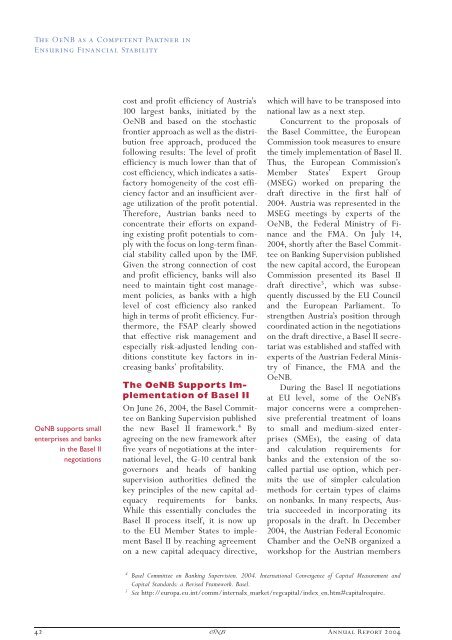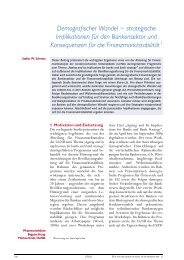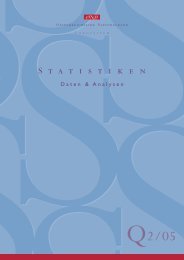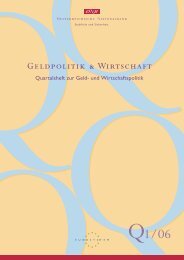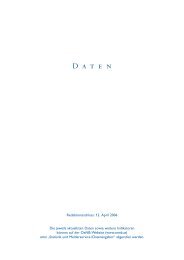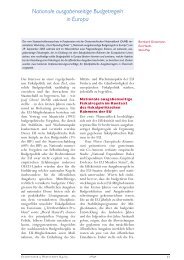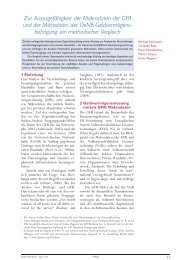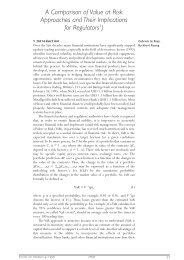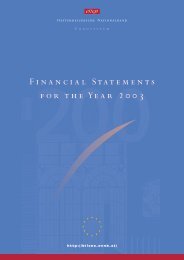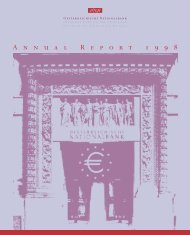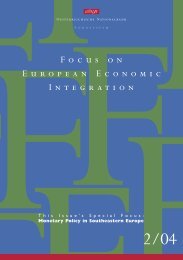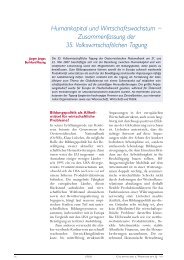You also want an ePaper? Increase the reach of your titles
YUMPU automatically turns print PDFs into web optimized ePapers that Google loves.
The OeNB as a Competent Partner in<br />
Ensuring Financial Stability<br />
OeNB supports small<br />
enterprises and banks<br />
in the Basel II<br />
negotiations<br />
cost and profit efficiency of AustriaÕs<br />
100 largest banks, initiated by the<br />
OeNB and based on the stochastic<br />
frontier approach as well as the distribution<br />
free approach, produced the<br />
following results: The level of profit<br />
efficiency is much lower than that of<br />
cost efficiency, which indicates a satisfactory<br />
homogeneity of the cost efficiency<br />
factor and an insufficient average<br />
utilization of the profit potential.<br />
Therefore, Austrian banks need to<br />
concentrate their efforts on expanding<br />
existing profit potentials to comply<br />
with the focus on long-term financial<br />
stability called upon by the IMF.<br />
Given the strong connection of cost<br />
and profit efficiency, banks will also<br />
need to maintain tight cost management<br />
policies, as banks with a high<br />
level of cost efficiency also ranked<br />
high in terms of profit efficiency. Furthermore,<br />
the FSAP clearly showed<br />
that effective risk management and<br />
especially risk-adjusted lending conditions<br />
constitute key factors in increasing<br />
banksÕ profitability.<br />
The OeNB Supports Implementation<br />
of Basel II<br />
On June 26, <strong>2004</strong>, the Basel Committee<br />
on Banking Supervision published<br />
the new Basel II framework. 4 By<br />
agreeing on the new framework after<br />
five years of negotiations at the international<br />
level, the G-10 central bank<br />
governors and heads of banking<br />
supervision authorities defined the<br />
key principles of the new capital adequacy<br />
requirements for banks.<br />
While this essentially concludes the<br />
Basel II process itself, it is now up<br />
to the EU Member States to implement<br />
Basel II by reaching agreement<br />
on a new capital adequacy directive,<br />
whichwillhavetobetransposedinto<br />
national law as a next step.<br />
Concurrent to the proposals of<br />
the Basel Committee, the European<br />
Commission took measures to ensure<br />
the timely implementation of Basel II.<br />
Thus, the European CommissionÕs<br />
Member StatesÕ Expert Group<br />
(MSEG) worked on preparing the<br />
draft directive in the first half of<br />
<strong>2004</strong>. Austria was represented in the<br />
MSEG meetings by experts of the<br />
OeNB, the Federal Ministry of Finance<br />
and the FMA. On July 14,<br />
<strong>2004</strong>, shortly after the Basel Committee<br />
on Banking Supervision published<br />
the new capital accord, the European<br />
Commission presented its Basel II<br />
draft directive 5 , which was subsequently<br />
discussed by the EU Council<br />
and the European Parliament. To<br />
strengthen AustriaÕs position through<br />
coordinated action in the negotiations<br />
on the draft directive, a Basel II secretariat<br />
was established and staffed with<br />
experts of the Austrian Federal Ministry<br />
of Finance, the FMA and the<br />
OeNB.<br />
During the Basel II negotiations<br />
at EU level, some of the OeNBÕs<br />
major concerns were a comprehensive<br />
preferential treatment of loans<br />
to small and medium-sized enterprises<br />
(SMEs), the easing of data<br />
and calculation requirements for<br />
banks and the extension of the socalled<br />
partial use option, which permits<br />
the use of simpler calculation<br />
methods for certain types of claims<br />
on nonbanks. In many respects, Austria<br />
succeeded in incorporating its<br />
proposals in the draft. In December<br />
<strong>2004</strong>, the Austrian Federal Economic<br />
Chamber and the OeNB organized a<br />
workshop for the Austrian members<br />
4 Basel Committee on Banking Supervision. <strong>2004</strong>. International Convergence of Capital Measurement and<br />
Capital Standards: a Revised Framework. Basel.<br />
5 See http://europa.eu.int/comm/internalx—market/regcapital/index—en.htm#capitalrequire.<br />
42 ×<br />
<strong>Annual</strong> <strong>Report</strong> <strong>2004</strong>


